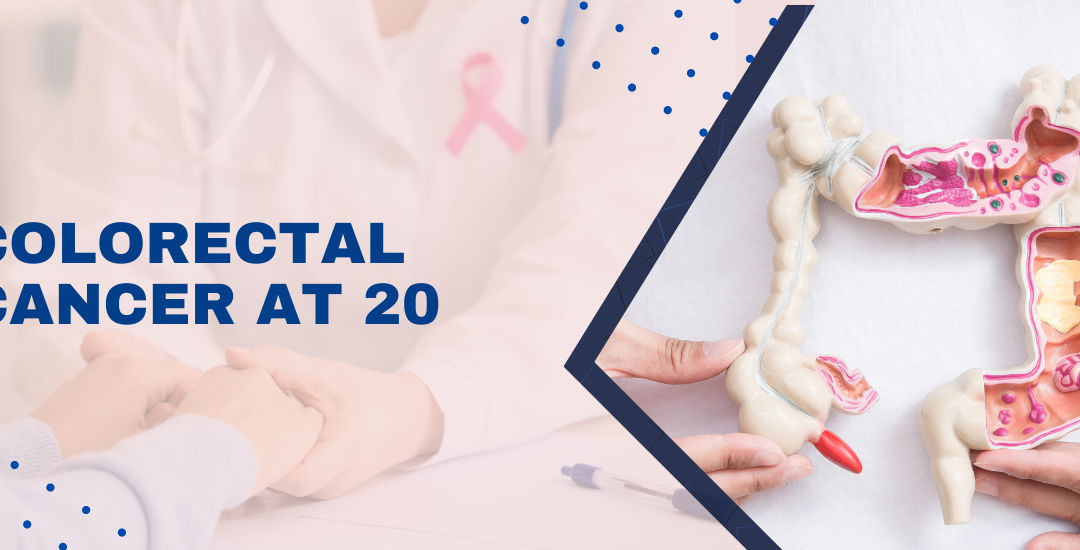Colorectal cancer isn’t just for older adults anymore. Young people in their 20s are facing this disease more than ever. This alarming trend has caught the attention of oncologists worldwide.
“We are seeing a significant rise in colorectal cancer cases among young adults, which is deeply concerning,” says Dr. Donald John Babu, a prominent oncologist in Navi Mumbai.
Colorectal cancer, also known as bowel cancer, starts in the colon or rectum as a small growth called a polyp. These polyps can be benign or malignant, with the potential for cancerous cells to grow and spread to other parts of the body if not treated early.
Early detection and treatment from specialists like Dr. Donald John Babu can significantly aid young patients in managing this unexpected and challenging diagnosis.

You might be wondering a lot about stomach cancer like “how it occurs” or “how should I proceed with treatment” etc. In this blog, we will cover a vast number of topics ranging from causes to treatment options which may help you make better decisions about your condition.
Dr. Donald John Babu is an esteemed cancer specialist in Mumbai known for his innovative and compassionate approach to providing personalized treatment plans to his patients.
He has over 15 years of experience in the field of oncology. He specializes in treating various cancers including throat, stomach, ovarian, and head and neck.
If you have concerns about colorectal cancer, book an appointment with an experienced oncologist today. Early detection offers a better prognosis.
How common is colorectal cancer at 20?

Colorectal cancer in 20s is relatively rare. It usually occurs in individuals above the age of 50. However, there has been an increasing trend in recent years of colorectal cancer diagnoses among young adults, although it still remains uncommon compared to older age groups.
According to recent studies, approximately 1 in every 10 colorectal cancer diagnoses occurs in individuals under the age of 50. This underscores the importance of awareness and early detection, even among younger populations.
Now, you might be wondering, what are the causes and risk factors of colorectal cancer age 20? Let’s understand!
Causes and risk factors of colorectal cancer at 20
The chances of getting colon cancer in your 20s are uncommon, but knowing what can increase your risk is crucial.
Genetic Factors: Some genetic issues, like Lynch syndrome or familial adenomatous polyposis (FAP), can raise your chances.
Family History: If close relatives have had colorectal cancer, your risk might be higher.
Inflammatory Bowel Disease (IBD): Conditions like Crohn’s disease or ulcerative colitis can increase the risk, especially when young.
Unhealthy Lifestyle Choices: Eating lots of processed meats, low-fiber food, and skimping fruits and veggies can play a part. Also, being inactive, smoking and heavy drinking can raise your risk.
If you are at risk, consult a healthcare professional for personalized guidance and screening recommendations.
Hold on, there’s more to this. Let’s explore the symptoms of colorectal cancer in young adults!
Symptoms of colorectal cancer at your 20s
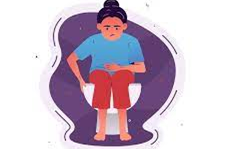 Colon cancer in your 20s symptoms include:
Colon cancer in your 20s symptoms include:
- Change in Bowel Habits: Notice any lasting changes like diarrhea or constipation.
- Blood in Stool: Spotting even a little blood needs attention.
- Abdominal Discomfort: Your abdomen hurts a lot and won’t stop.
- Unexplained Weight Loss: Losing weight without trying.
- Fatigue: Feeling tired all the time, even with enough rest.
- Weakness or Anemia: Dizziness or shortness of breath due to low red blood cell count.
These signs don’t always mean cancer but talk to your doctor if they persist. Early diagnosis can save lives!
Now, let’s talk about the types of colorectal cancer that can affect you in your 20s.
Types of Colorectal Cancer when you are 20
 Colorectal cancer in your 20s makes up only about 1% of all colorectal cancer cases. The different types of colorectal cancer include:
Colorectal cancer in your 20s makes up only about 1% of all colorectal cancer cases. The different types of colorectal cancer include:
- Adenocarcinoma: This is the most common type of colorectal cancer, arising from the glandular cells lining the colon or rectum.
- Carcinoid tumors: These rare neuroendocrine tumors can develop in the digestive tract, including the colon and rectum. While they tend to grow slowly, they can still metastasize to other organs.
- Gastrointestinal stromal tumors (GISTs): Although more commonly found in the stomach or small intestine, GISTs can also occur in the colon or rectum.
- Lymphomas: While lymphomas usually affect lymph nodes, they can occasionally arise in the gastrointestinal tract, including the colon and rectum.
If you are at risk, consult a healthcare professional for personalized guidance and screening recommendations.
Discover how colorectal cancer at the age of 20 can affect your daily life…..
Impact on daily life
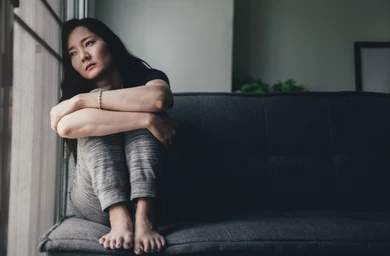 Colorectal cancer can significantly impact daily life, like:
Colorectal cancer can significantly impact daily life, like:
- It causes physical symptoms like fatigue and nausea.
- There are emotional challenges such as anxiety and depression.
- There can be changes in diet and body image.
- Treatment may require time off from work, leading to financial strain.
- Relationships may be affected due to the emotional toll.
Support groups can help manage these effects and improve quality of life. Taking care of yourself, staying in touch with your doctor, and adjusting your routine as needed can make things more manageable.
An oncologist can help in diagnosing the disease and suggesting effective treatments!! Visit the clinic at the earliest!
Timely diagnosis is important!! Let’s understand the various diagnoses before moving on to the treatment!!
Diagnosis of colorectal cancer at 20
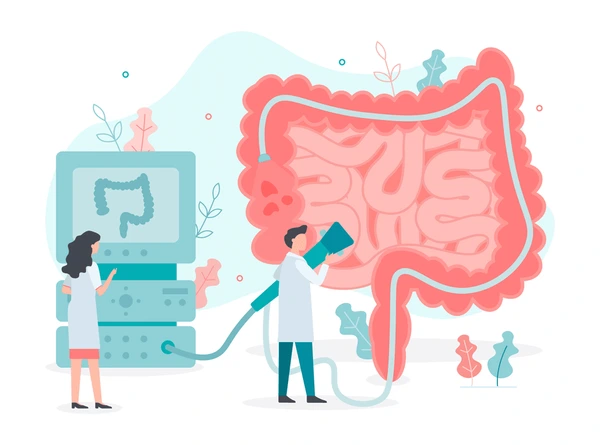 If you are experiencing symptoms, it is necessary to seek medical attention promptly. Your doctor may recommend tests or imaging scans to investigate further. Early detection is key for effective treatment.
If you are experiencing symptoms, it is necessary to seek medical attention promptly. Your doctor may recommend tests or imaging scans to investigate further. Early detection is key for effective treatment.
Diagnostic tests for colon cancer in 20s
- Colonoscopy
- Flexible sigmoidoscopy
- Virtual colonoscopy (CT colonography)
- Fecal occult blood test (FOBT)
- Fecal immunochemical test (FIT)
- Stool DNA test (FIT-DNA)
- Double-contrast barium enema
- Biopsy
- Blood tests for tumor markers
- Imaging tests (such as CT scan, MRI, PET scan)
Let’s focus on the treatment options available for colorectal cancer in your 20s.
Treatment options for colorectal cancer at 20
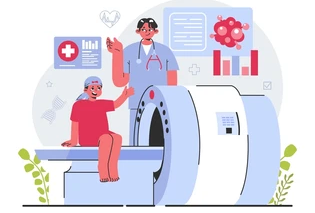
Knowing the treatment options can help make informed decisions. Here is how colon cancer at 20 can be treated:
- Surgery: Surgeons aim to remove the tumor and any nearby lymph nodes. Sometimes, they might need to create an opening in the abdomen (a colostomy or ileostomy) to help with waste removal.
- Chemotherapy: This involves using powerful drugs to kill cancer cells. It can be used before or after surgery to shrink tumors or eliminate any remaining cancer cells.
- Radiation Therapy: Beams with high energy targets and destroy cancer cells. It’s often used along with surgery or chemo to tackle tumors that are hard to reach. These beams can help in shrinking the tumor before surgery.
- Targeted Therapy: These drugs target specific molecules in cancer cells, disrupting their growth. They are effective in treating certain genetic mutations.
- Immunotherapy: This treatment boosts your immune system to fight off cancer cells. It’s showing promise, especially for those with certain genetic traits.
“Understanding your treatment options empowers you to take an active role in your journey against colon cancer. With advancements in medical science, we tailor therapies to each individual’s unique circumstances, ensuring the best possible outcome,” explains Dr. Donald John Babu a competent oncologist in Mumbai.
Can colorectal cancer at 20s be prevented? Let’s find out.
How to prevent colorectal cancer at 20?

While it is not always possible to prevent colorectal cancer entirely, some measures can significantly reduce the risk of developing the disease.
- First off, eat lots of fruits, veggies, and whole grains.
- Try to get some exercise for at least 30 minutes every day.
- Avoid smoking and drinking.
- Last but not least, know your family history. If there’s colorectal cancer in your family or certain genetic conditions. Discuss with your doctor about screenings.
Taking these steps sets you up for a healthier future.
Stay proactive and consult with your oncologist for personalized guidance and preventive care.
If you have any further doubts, check out the FAQs below.
FAQs
Is stage 3 of colorectal cancer treatable?
Yes, stage 3 colorectal cancer is treatable. Treatment typically involves a combination of surgery, chemotherapy, and possibly radiation therapy.
Is colorectal cancer at 20 hereditary?
Colorectal cancer at your 20s can be linked to genetic factors, such as Lynch syndrome or familial adenomatous polyposis (FAP). These can increase the risk of developing the disease.
How can I support a loved one diagnosed with colorectal cancer at 20?
Supporting a loved one with colorectal cancer in 20s involves offering emotional support. Help them with practical needs. Go with them to medical appointments. Help them adhere to their treatment plan and instructions.
Can lifestyle changes reduce the risk of colorectal cancer at 20?
Yes, changes like regular exercise, a balanced diet, and quitting smoking and alcohol can help in reducing the risk.

